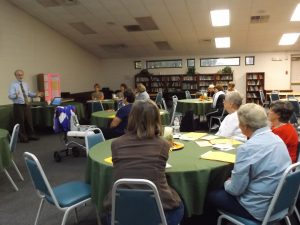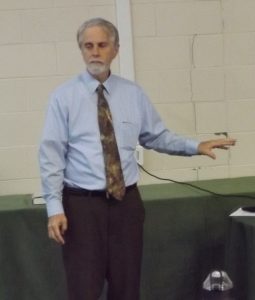September 28, 2017 // Diocese
Women learn how to better hear God’s voice
Several women attended the Be It Done evening of reflection for women at St. Vincent de Paul Parish in Elkhart on Sept. 12, drawn by the topic, “Hearing God’s Voice.”

Several women from the Elkhart County area attended a women’s evening of reflection as part of the Be It Done women’s ministry on Sept. 12 at St. Vincent de Paul Parish in Elkhart. The topic for the evening was “Hearing God’s Voice” with presenter Steve Royal, director of liturgy at St. John the Evangelist Parish, Goshen.
Stephen Royal, director of liturgy at St. John the Evangelist Parish, Goshen, was the presenter for the evening. Royal recently received his Master of Theology degree from Franciscan University in Steubenville, Ohio, and Lori Massa, coordinator for the Be It Done program, has heard him speak on the evening’s topic once before.
“I knew he’d be able to speak intelligently to the subject, which is neither male nor female,” she said.
Royal told the women he was thankful he’d been learning to listen for God, after going through what he called a “mysterious illness.”
“What helped me through was listening to the voice of God — the Holy Spirit was always encouraging, always uplifting. God kept telling me, ‘You’ll be fine.’”
 Royal shared three goals of a Christian life — to have a spiritual, personal relationship with God; to have a Spirit-led vocation; and to become a saint and behold the beatific vision of God in heaven forever.
Royal shared three goals of a Christian life — to have a spiritual, personal relationship with God; to have a Spirit-led vocation; and to become a saint and behold the beatific vision of God in heaven forever.
He said it is “not presumptuous to think that God could speak to you. It is not a matter of being holy enough or worthy to hear God speak; it is a question of willingness to turn to God and listen.”
Royal said that because of man’s fallen nature it can be hard to hear God’s voice, but it’s important to learn to listen — not only to do God’s will, but also because “it could save our lives.” He said sometimes God tells us to “do something weird to test us to see if we’ll really listen.”
Those in attendance were given seven steps to cultivate a sensitive heart to hear God’s voice.
1. Be in a state of abandonment, humility and willingness before you ask God what he wants you to do.
2. Find a quiet place and time — it could be in church, a prayer room in the home, or outside. The key is for it to be quiet.
3. Offer God worship in song and prayer.
4. Believe that God cares for you and wants to speak to you. He cares about the little things, too.
5. With intention, ask God to speak to you and for help so that you may hear him.
6. Pay attention. Be attentive and open to all the ways God may be speaking to you — through the liturgy and Scripture, through circumstances and answered prayers, and through the advice of mature Christians. Sometimes God speaks to his people through our dreams.
7. Seek confirmation from mature Christians or a spiritual director — sometimes they may know or perceive things about you that you don’t.
Royal advised writing down prayer requests in a journal and looking back later to see what and how those prayers were answered.
God often speaks through the liturgy and worship of the Mass, through the teachings of the church and through Scripture study. Royal said Pope Benedict XVI wanted everyone to apply the Benedictine practice of Lectio Divina as a means of communicating with God through Scripture.
“In Lectio you are asking, ‘What does this text mean to everyone?’ In Meditatio you are reflecting upon ‘What does this Scripture say to my life?’ In Oratio, ‘What can I say to the Lord in response?’ In Contemplatio, ‘How is God with me? How do I feel his presence?’ And in Actio, you should obey what God has told you through your actions.”
God also speaks to man through symbols in creation, relationships, answered prayers and circumstances, charisms and through impressions and locutions. One should always be careful to discern whether this truly is the Lord speaking, and ask others for help in that discernment process.
Ways one can discern include asking these questions — Is it consistent with the Church’s teaching? Is it consistent with teaching and tone of Scripture? Will it make me more like Christ? Does my parish family confirm it? Is it consistent with how God made me? Is it convicting rather than condemning? Do I sense God’s peace about it?
Laure Hund-Schieber said after the program that she was at the stage in her life where she wants to know if she should keep doing what she’s been doing or if God has something else in mind for her. She said she’s been trying to discern but the program “gave me the tools and the resources I needed, and also hope. I’ve been told that he talks to you but I wondered if he has more to say to me.”
Hund-Schieber said she is a recent empty nester and is content with her life, but with a yearning that makes her think that there is something more that God wants her to do.
She has attended other Be It Done programs and said she likes them because they’re “short and sweet — with a busy schedule it’s nice to be able to come. I always walk away with another light going off,” she said. “I can relate to the speakers, too, they’re just regular people not big theologians — they’re living life just like I am and it (the programs) gives me bits of wisdom.”
The next Be It Done program will be held in early December. For more information visit www.beitdone.org.
The best news. Delivered to your inbox.
Subscribe to our mailing list today.






